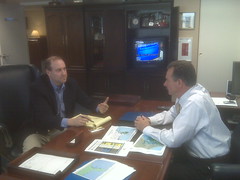In an interview last week on the eve of the third anniversary of Hurricane Katrina, FEMA Administrator R. David Paulison told me that the agency has been “rebuilt” and is “ready” for the next major hurricane or other disaster. Unfortunately, he may have a chance to test his assessment in the next several days as Tropical Storm Gustav heads towards the U.S. mainland threatening the Gulf Coast with what forecasters say could become a Category 3 hurricane. Paulison is now in the region as preparations are being made for a possible Monday landfall.
Paulison says he wants Americans to know that FEMA has worked very hard to overhaul itself in the years since Katrina. ”This is a responsive organization again,” he says, adding, “There has been a change of culture. We have gone from a reactive to proactive agency.”Â
Paulison took over FEMA in April, 2006, and the agency has received largely good reviews for its work in recent major disasters including this summer’s floods in the Midwest and last year’s Southern California fires. The agency has doubled its budget and distributed $25 billion in preparedness grants to communities around the U.S, according to Paulison. ”The public should know that FEMA is ready.”Â
However, he emphasizes that FEMA and local authorities are relying on the public to do its share when it comes to emergency preparedness. In fact, Paulison says that citizens are an integral part of the nation’s disaster response effort by taking care of themselves and their families (as well as neighbors who need assistance) and therefore lightening the load on emergency personnel. ”All the states, local communities working together cannot take the place of personal responsibility for taking care of yourself,” notes Paulison.
He says every citizen should have emergency supplies, a communications plan and know where they would go in the event of an evacuation. ”If individuals don’t take that responsibility, this country is not going to be ready and be able to take care of everyone.” Paulison says emergency personnel rely on those who can help themselves to do so so they can focus on those who, for physical, mental, logistical, or financial reasons, cannot.
Interviewing FEMA Administrator R. David Paulison at the agency’s Washington, D.C. office
Yet, Paulison acknowledges the difficulty of getting the personal readiness message through to much of the public. ”We need to return to a culture of preparedness. We’ve gotten away from the preparedness ethic of the 50’s and 60’s.”
To me, a way to engage the public and spur a greater commitment to preparedness might be to more explicitly communicate the two choices (one positive, one negative), as described by Paulison, that citizens can make when it comes to personal emergency preparedness: you can either be part of the problem and make things more difficult for first responders, but you also can be part of the solution by helping them by what you do before and during a disaster.
This public messaging approach would combine a bit of both the stick and the carrot. It would also underscore to the citizenry that emergency responders see them as an integral part of the nation’s disaster preparedness and response effort, something I do not think that most people realize. It would also help explain the citizen’s role and responsibility in emergency preparedness, and give them a better sense of where they fit in the bigger picture.
I don’t believe the government should be afraid to explicitly tell the public that each of us can either hinder or help relief efforts by what they decide to do before and during a disaster. And, that it’s up to each of us to choose. I think that’s a choice and a challenge that might get people’s attention and maybe lead to action.





1 response so far ↓
1 ‘Do Ask & Do Tell’ — Govt Should Be Putting More Emphasis On “Personal Responsibility” In Its Citizen Preparedness Messaging // Aug 26, 2010 at 11:11 am
[...] former FEMA Administrator R. David Paulison in an interview told me that FEMA and local authorities are relying on the public to do its share: â€All the [...]
Leave a Comment